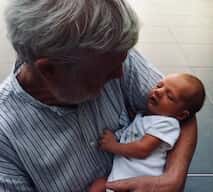When my daughter, my only child, was born, I did what all new parents do. I imagined her future. I constructed a fantasy life in which she would be healthy, happy, beautiful, intelligent and successful. A life in which nothing would ever go wrong. It was a delusion of course. Nobody gets that deal.
I’m lucky that my daughter has fulfilled many of my hopes, but she has had her fair share of hardships. When problems happen, as a father you feel that you have failed in some way to ensure your child’s perfect life. It’s irrational, and you can tell yourself so, but every now and then a niggling little voice at the back of your mind wonders if you could have intervened in some way. Then the rational part of your brain kicks in and you tell yourself, ‘It’s her life, you have to let her live it, you can’t force her decisions into your template.’
When my daughter had her son, my only grandchild, I did it all again. I imagined that he would grow up tall, strong, handsome. He would become a brain surgeon or play football in the Premier League. Self-indulgent fantasies. But I became uneasy before he was two years old. He didn’t seem to want to interact with other children. He seemed unhappy outside his home environment. Later there were other warning signs, such as walking on tip toes and excited hand flapping. I began to suspect that he might be autistic.
The fantasy perfect parenthood that I had imagined for my daughter was beginning to crumble, but as a grandparent it wasn’t my place to demolish her dreams.
What to do? What I did, was to read as much as I could find about autism and other possible conditions that could show similar symptoms. The Internet is great for easy access to information, but it’s also pretty scary. I learned about conditions that I’d never heard of. Rare neurological disorders that are untreatable. I learned about parents who cope in the most difficult circumstances with amazing perseverance and love. My objective was to be sufficiently well informed to be helpful when asked, but not to offer an opinion until it was invited.
My daughter also did her research, in a typically thorough manner, and saw consultant after consultant, most of whom offered conflicting opinions. After two comprehensive paediatric assessments, she announced that my grandson is autistic. By that stage my reaction was “Good, it’s only autism, now let’s see what we need to do to help him.”
We neuro-typical people have a tendency to generalise about non-typical groups. People will say “they do this” or “they do that”. Whilst there are common flags in autism, I discovered that autistic people are just as varied and unique as the rest of us. The challenge is to get to know the individual, find out what motivates them, try to understand the world from their viewpoint and from there invite them to share with you. Don’t try to impose your approach to life, help them to explore and develop their own.
How do I feel about having an autistic grandson? Any sadness that I feel is mainly because his life will not match up with my daydreams, so that is only selfishness. It’s true that I worry that he may face more difficulties than most children, but I’m confident that, like any child with special needs, inherent human adaptability will enable him to find a way to fulfil his own goals. He has excellent therapists and loving, supportive parents who dedicate a lot of time to building his skills. He is perhaps lucky that he is an only child because he will not experience differences between himself and siblings. The special love and attention that he receives will not seem special to him, it will just be how things are in his special world.

